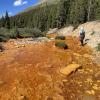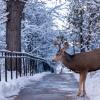Climate & Environment
- Researchers at the McMurdo Dry Valleys Long-Term Ecological Research Program have spent more than three decades studying ecosystems in one of the world’s most hostile environments.
 Off the west coast of Australia, some seawater has lost nearly a third of its salty area in recent decades, as climate change-related current shifts push more fresh water into the region.
Off the west coast of Australia, some seawater has lost nearly a third of its salty area in recent decades, as climate change-related current shifts push more fresh water into the region. A new paper from Irina Overeem and Ethan Pierce describes how icebergs export Greenlandic sediment into the Arctic Ocean—and how that process might change in the future.
A new paper from Irina Overeem and Ethan Pierce describes how icebergs export Greenlandic sediment into the Arctic Ocean—and how that process might change in the future. For CU Boulder ecology and evolutionary biology alum Emma Vogel, an award-winning photo captured a vital moment of research and science.
For CU Boulder ecology and evolutionary biology alum Emma Vogel, an award-winning photo captured a vital moment of research and science.- New research reveals that "introverted" animals that don't live in stable social groups may be more vulnerable to extinction.
 CU Boulder researcher Twila Moon shares what is at stake as President Trump bids for Greenland.
CU Boulder researcher Twila Moon shares what is at stake as President Trump bids for Greenland. A sediment record millions of years old revealed that the tropical Andes heated up dramatically when atmospheric CO2 levels were similar to today’s.
A sediment record millions of years old revealed that the tropical Andes heated up dramatically when atmospheric CO2 levels were similar to today’s. Mountain pine beetles are exploding in numbers again, killing ponderosa pines across large swaths of Colorado. A CU Boulder entomologist explains why it's happening and what it means for wildfire risk.
Mountain pine beetles are exploding in numbers again, killing ponderosa pines across large swaths of Colorado. A CU Boulder entomologist explains why it's happening and what it means for wildfire risk. Diane McKnight and Tom Marchitto are collaborators on a new project looking for a way to extract rare earth metals from contaminated Colorado streams. The goal is to improve water quality while also increasing the domestic supply of raw materials for advanced technologies.
Diane McKnight and Tom Marchitto are collaborators on a new project looking for a way to extract rare earth metals from contaminated Colorado streams. The goal is to improve water quality while also increasing the domestic supply of raw materials for advanced technologies. This year, the normal blizzards haven't come to most of Colorado, but atmospheric scientist Jennifer Kay says there's still time for the season to turn around.
This year, the normal blizzards haven't come to most of Colorado, but atmospheric scientist Jennifer Kay says there's still time for the season to turn around.


